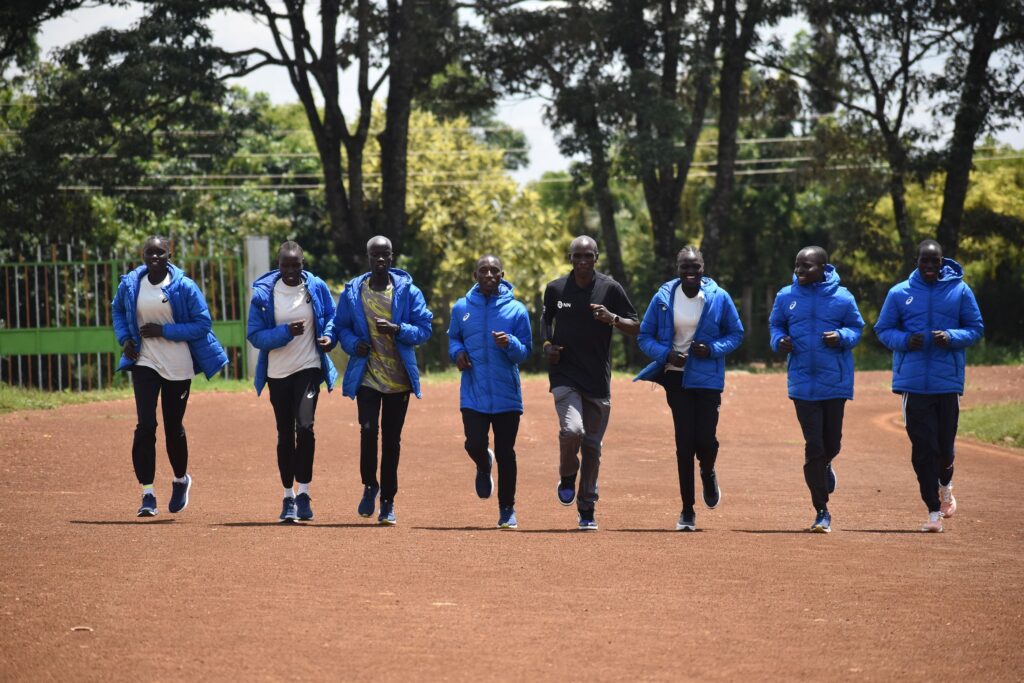Last week, Kenya’s marathon legend and two-time Olympic champion Eliud Kipchoge spent the day mentoring members of the World Athletics Athlete Refugee Team at the Eliud Kipchoge Sports Complex in Kapsabet.
Known for his humility and unparalleled success in athletics, Kipchoge inspired the young athletes with a heartfelt message, emphasizing resilience and purpose in the face of adversity.
“I came here to tell you that being a refugee is not the end of life. In fact, it is the beginning of life because as a refugee you have a lot of fruits hanging in this world,” Kipchoge encouraged.
“Do not treat yourself less because you are refugees; we are all equal as human beings.”
Seven student-athletes, including World Athletics Athlete Refugee Team members Perina Nakang, Mfite-Umukiza Jules, Estherina Julius, and Zinad Akulang, as well as sponsored athletes Peter Lotino Akileo, Peter Lopeyok Michael, and James Lokibich, were captivated by Kipchoge’s words. Armed with pens and notebooks, they eagerly noted his advice on life and success.
Kipchoge’s interaction with the athletes was direct and motivational. “The whole world has recognised you as a country. Are you happy?” he asked, receiving an enthusiastic “yes” in response. “Being recognised means you are the best. Have faith in yourself, in your school, and your coaches. Have respect.”
Throughout the session, Kipchoge highlighted values like self-discipline, consistency, and self-belief. He urged the athletes to prioritize both education and athletics, underscoring the importance of a holistic approach. “When you have education and talent, you can be somebody,” noted Peter Lopeyok Michael.
The mentorship session focused less on Kipchoge’s historic accolades and more on building a strong mindset. “In their faces, I saw the future of the refugee team, the future of their countries, and the future of sport,” Kipchoge said. He encouraged them to see themselves as part of a unique global community. “In the whole world, we have 206 countries participating in the Olympics, but we have plus one – the Refugee Team, to make 207 countries. They have a big opportunity to grab.”

For these young athletes, who have endured hardship and uncertainty, Kipchoge’s message was transformative. “They are hard to mould because they have passed through a hard life, but at the same time, they are easy to mould because they understand tough life better than anybody else,” he reflected. “You bring that tough life to education and sport here in Kenya, they are ready to move in.”
Their admiration was evident. Meeting Kipchoge was a dream for many, like Lopeyok Michael, who commented, “Finally, I have met him. He is somebody like me.” Similarly, Mfite-Umukiza Jules shared, “I thought he was different, but Kipchoge is very encouraging.”
The day was filled with valuable exchanges, laughter, and shared aspirations. When asked about their goals, Julius responded, “To succeed, help my family, respect others, stay humble, and work hard in athletics.” Kipchoge urged them to aim high, emphasizing, “Do you want to be successful or be a legend?”
Kipchoge also shared his personal experiences with resilience, revealing how he handled setbacks. “You have to experience pain and frustrations to know how to handle success when it lands on you,” he explained.
Head coach Janeth Jepkosgei, a former 800m world champion, praised the mentorship session: “The team will see their lives differently. They are motivated, encouraged, and believe education and athletics can change their lives and communities.”
Through his mentorship role, Kipchoge aspires to inspire the refugee athletes to excel for generations to come. “I treat the U20 athletes as the next generation,” he said. “I want them to proceed beyond 2045, promoting sport, education, and development.”
Kipchoge, who has five of the 11 fastest marathon times in history, hailed the Athlete Refugee Team programme established by World Athletics, which has supported refugee athletes since 2016. “These are the flowers of World Athletics, what they have been doing,” he said.
For Kipchoge, empowering refugee athletes is about building a brighter future. In their faces, he sees the potential for greatness.
Source: World Athletics
